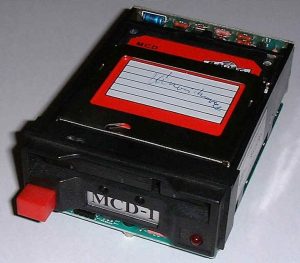BRG MCD-1 cassette floppy disk
The predecessor of the 3.5″ floppy disk system – in a 3″ version – was developed by Marcell Jánosi at the Budapest Radio Engineering Factory ( BRG ) in 1973. The disk and its associated BRG MCD-1 drive received domestic patent protection in 1974, but this was wasted due to lack of sufficient support — a sad example of the many unused Hungarian ideas.
Own development, based on a service patent
Distributors: Metrimpex Foreign Trade V. and Videoton Rt.
Use
Large amounts of electronic data storage
Not widely spread
Some of its copies were installed in Germany in microcomputers that were just appearing at the time.
An adapter was made for the ZX Spectrum and Commodore 64 machines.
Information Technology History Exhibition
MMKM Technical Study Library (1117 Budapest, Prielle Kornélia u. 10.), adapted for ZX Spectrum
Structure
The plate rotating assembly was driven by a DC brushed motor via a rubber belt transmission.
The head movement was performed by a spiral disk rotated by a stepper motor.
Data was stored on one magnetized side of a 3″ diameter floppy disk, in circular tracks with a density of 100 tracks per inch.
Speed: 422 rpm
Operation
Storage capacity: 200 kB; data transfer rate: 250 kbps
Data recording mode: FM/MFM
Sector detection on the data medium: soft-sector
The essence of the innovation was that the floppy disk was equipped with a centering and driving core and housed in a solid casing (cassette).
Program set
- operating system: none; the storage device ran under the current operating system
- compilers: none
There were no
Historical curiosities
The novelty of the disk was its solid case and a centered disk with a diameter of only 3” which, when mounted in a rectangular case, could comfortably fit in a vest pocket; and its drive was about a tenth the size of the large floppy disks of the time, with the same storage capacity!
A brief history of its birth:
- 1973 – the idea
- 1974 – service patent (No. 170790, 1974.11.30.)
- 1979 – working prototype
- 1980 -1981 – international inquiries
- 1982 – market launch
Based on the domestic, service patent received in 1974, a regular battle broke out for utilization, production, and the establishment of international cooperation. Although leaders of several global companies (e.g. Jack Tramiel) came to negotiate, the leaders of BRG did not recognize the significance of the invention, but rather advocated the development of the bubble magazine, as we know, unsuccessfully. Due to the socialist corporate approach and the lack of sufficient production intention, the protection was lost, and Sony eventually won the competition battle. Thus, the main external data carrier for PCs for years was the 3.5” cassette floppy, which evolved from the Jánosi model, which was 10 years ahead of its time.
Due to complaints and lack of support, only a few thousand copies of the device were produced in the early 1980s, although it was also presented in the Western press and a version ported to the ZX Spectrum was also released in limited numbers; however, its clones and improved versions spread throughout the world.
“Hungarian creators have a good professional school, they have the brains to invent “first mover” products, so let’s take advantage of our inherited good qualities. I also hope that the environment around us will change to our benefit. Even if slowly, venture capital will eventually become available,” said inventor Marcell Jánosi at the 6th Congress of the Hungarian Society of Industrialists and Entrepreneurs in 1995.
Resources
General Introduction: The MCD-1 (video)
Full detailed technical description: Technical Manual (English)
Marcell Jánosi: Development of cassette floppy at BRG
The invention was praised by numerous domestic professional journals, including Index.
Pictures from the Drive: Milestones in the History of Computing Exhibition
Created: 2015.09.16. 19:38
Last modified: 2024.05.20. 21:59

